6
Upcoming ad conference to bring wealth of information, increase sales with data
Guest Column:
To build trust and your audience, show how much you care, not just how much you know
By Al Cross
Public notice bill fails in House Committee on Wednesday
House Bill 1616, which would provide city and county governments the option of publishing certain kinds of public notice on a website instead of in newspapers, failed Wednesday morning in a vote in the City, County and Local Affairs Committee of the Arkansas House of Representatives. The bill, for an act to be entitled “To Amend The Law Concerning Publication Of Notice; To Allow The Publication Of Notice On A Website; To Amend The Law Concerning Counties And Municipalities And Publication; To Amend The Law Concerning Elections; And For Other
Purposes” was introduced on March 13 by Rep. Frances Cavenaugh, R-Walnut Ridge, as an amended version of House Bill 1399. It replaced the original bill due to the number of revisions made, the result of a compromise reached between APA and the committee.
"Because we made so many revisions to it, because this is agreed-upon language, we just filed a new bill," Cavenaugh told the committee prior to the vote.
The original HB 1399 removed election and delinquent tax notifications from
printed newspapers to government-run websites, in some cases as early as January 1, 2024. APA was originally opposed to HB 1399.
The compromise included a five-year sunset period, after which municipalities and counties had the option to continue to run the notices either in their local newspaper or move to a website, stipulated that any website publishing public notices be run by an independent third party, and required a year of advertisements in the newspaper alerting
House committee hears four hours of testimony on Freedom of Information bills; rejects one and approves the other
By Wesley Brown
As the Arkansas General Assembly moves closer to wrapping up Gov. Sarah Huckabee Sanders's first legislative session, two bills that could substantially alter the state's 55-year-old Freedom of Information statute saw dramatically different results Wednesday evening.
In a marathon hearing at the Arkansas State Capitol that lasted well into the evening, the House State Agencies and Governmental Affairs Committee heard testimony on House Bills 1726 and 1610, both of which target critical portions of the Freedom of Information Act.
HB 1726 by Rep. David Ray, R-Maumelle, would seek to expand the state FOIA with seven key provisions that would alter the original intent of the Arkansas Freedom Information Act, first signed into law by former Gov. Winthrop Rockefeller in
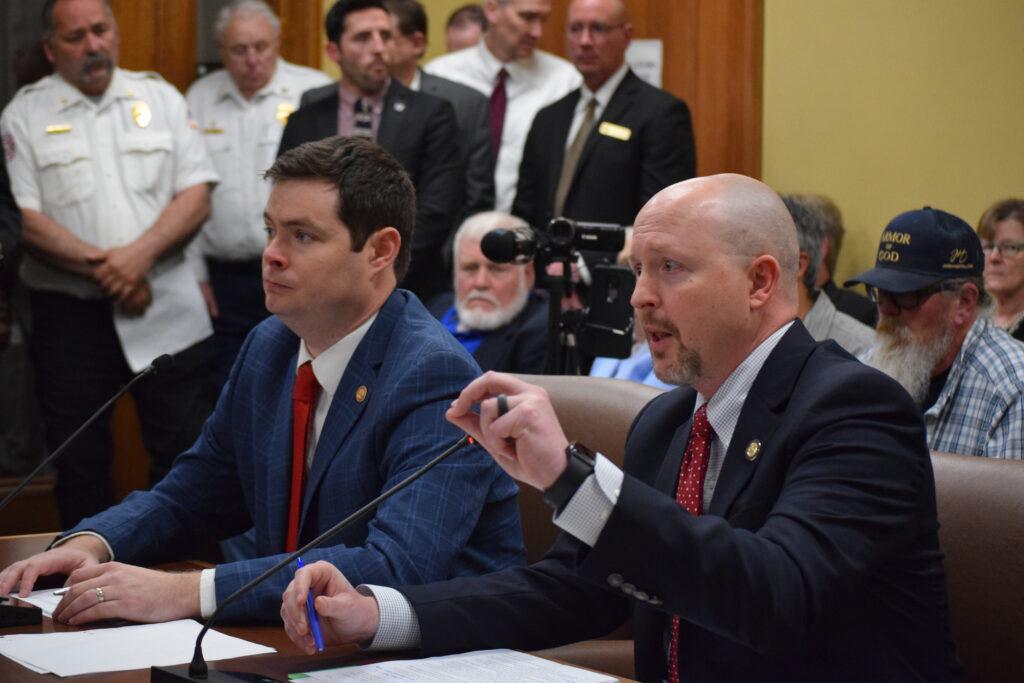
Weekly Vol.18 | No. 13 |
|
on Page 3
Arkansas Press Association Publisher
Friday, March 31, 2023
Serving Press and State Since 1873 Continued
Continued on Page 6
2
Rep. David Ray listens as Deputy Attorney General for Opinions Ryan Owsley discusses details of House Bill 1726 in a hearing Wednesday. (Photo by Antoinette Grajeda/Arkansas Advocate)
APA Better Newspaper Editorial Contest

now open for submissions
The 2023 APA Better Newspaper Editorial Contest is now open for submissions to showcase the work of the editors, reporters, designers and photographers who worked so hard during 2022.
This year’s submission categories include News Story, Feature Story, Series Reporting, Investigative Reporting, Beat Reporting, Sports News Story, Sports Feature Story, Sports Column, Editorial, News/ Political Column, General Interest Column, Humorous Column, Freelancer Recognition and Headline
Writing as well as a variety of photography, community coverage, layout and design and digital, including social media and podcasts, categories.

All work must have been published in the 2022 calendar year. The deadline for submissions is Friday, April 28.
The 2022 APA Better Newspaper Editorial Awards winners presentation will be made at the conclusion of the 2023 APA Convention at the DoubleTree Hotel in Little Rock on July 22.
For complete contest category information, rules and to enter, visit newspapercontest.com/Contests/ ArkansasPressAssociation.aspx. The login name and password remains the same as previous years, but if you need assistance please email terri@ arkansaspress.org.
Upcoming ad conference to bring wealth of information, good times for all
Make your plans now to attend the 2023 APA Advertising Conference on Friday, April 28, at the Red & Blue Events Venue in Little Rock.
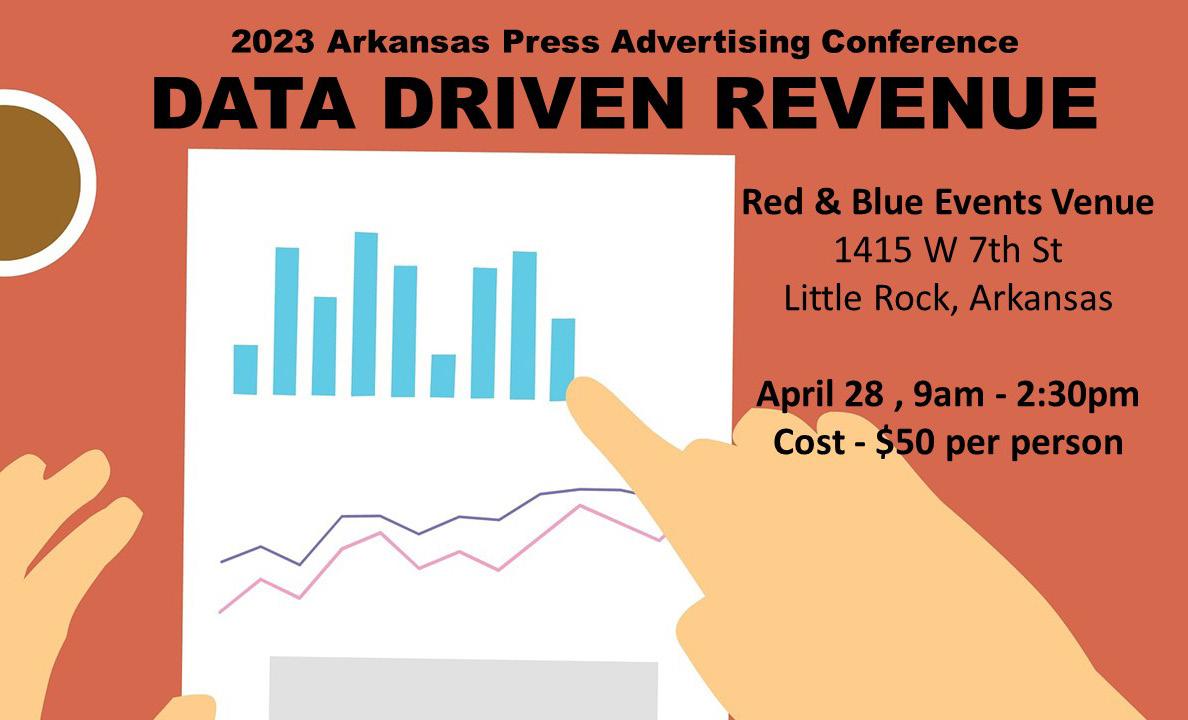
This year’s conference will be held in person for the first time in three years. The conference was held via live Zoom in 2021 and 2022 due to the ongoing pandemic. Marianne Grogan, president of Coda Ventures in Nashville, Tennessee will be the primary speaker at this year’s ad conference. In her session, “Data-Driven Revenue”, she will take participants through the results of the statewide study commissioned by APA in 2022 and demonstrate how the data can be used by newspapers for successful sales conversations.
Following the session will be a panel discussion, “Best Revenue Products,” featuring Jennifer Allen, owner and publisher of the Hot Springs Village Voice; and Rhonda Overbey, regional publisher and advertising director of the Malvern Daily Record and the Saline Courier in Benton.
The day will also include a luncheon and the APA Better Newspaper Advertising Contest awards ceremony, which will be emceed by Roby Brock of Talk Business & Politics
Tickets for the day are $50 and include all events. Purchase at arkansaspress.org/ advertising-conference/. If you have any questions, email info@arkansaspress.org
Arkansas Publisher Weekly 2 March 31, 2023
J OI N TODAY AT arkpre ss w om en .wordpress.com Contest s, Networ king & P rofessional D evelopme nt Follow us @ArkansasPressWomen Arkansas Press Women Enc ou ra ging communi cat ors since 194 9 arkansaspresswomen.org includes lunch
House committee hears four hours of testimony on Freedom of Information bills; rejects one and approves the other
Continued from Page 1
1967. The committee eventually voted to reject the bill in a 9-4 vote.
Yet, after a nearly 45-minute presentation of his bill, Ray and Arkansas Deputy General Counsel for Opinions Ryan Owsley told the committee that HB 1726 had broad support from all state government and law enforcement officials statewide.
"Before I walk through the mechanics of the bill, I just want to state that this bill has broad support. It is supported by Gov. Sarah Huckabee Sanders, Attorney General Tim Griffin, Secretary of State John Thurston, and law enforcement are united in support of this bill, including State Police, the Sheriff's Association and the Chiefs of Police," Ray said.
Ray then drilled down into each key provision of the six-page bill filed on Monday, March 27, and set for a special order of business in the House committee. In making his pitch, Ray told the panel that parts of the FOIA needed to be updated, and it was challenging to debate opponents on the merits of the 55-yearold law.
"You know, there are some things in our politics where it is sometimes difficult to have an honest conversation about. Social Security comes to mind; insolvent pension systems is another, and then there is FOIA," Ray testified. "And in almost every discussion of FOIA, the debate is painted as a binary choice."
In closing, Ray told the House committee that he skipped a meeting with the legislature-appointed FOIA Task Force due to a scheduling conflict with another bill he had to present in the Senate. The task force held a virtual emergency meeting on Tuesday, March 28, where they unanimously backed recommendations to reject both FOIA proposals before the House committee. They also supported sending an additional "strong message" to the legislature that HB 1726 was not in the "best interest of the people of Arkansas."
Among many things, HB 1726 would exempt "undisclosed or ongoing investigations by law enforcement agencies of suspected criminal activity and any evidence or materials likely to
be used by law enforcement in a criminal prosecution."
It would also amend the FOIA statute regarding exempt communications between a public official and government legal counsel and records related "to a needed determination of policy or action." Records exempt from public purview under HB 1726 include legal drafts, notes, recommendations, memorandums and correspondence, among other documents.
Following Steinbuch's broadside, APA past presidents Ellen Kreth and Rusty Turner offered strong testimony against Ray's bill. Kreth, owner and publisher of the Madison County Record, provided real-world examples of how the state's FOIA has helped the press uncover and investigate cases of sexual misconduct, fraud and corruption.
"In this (legislative) session, a lot of the bills have been about helping children," Kreth told the committee. "This bill harms them and would gut FOIA …."
Turner, the editor of the Northwest Arkansas Democrat-Gazette, called HB 1726 a "misguided bill" that would diminish the public's access to the workings of local and state government.
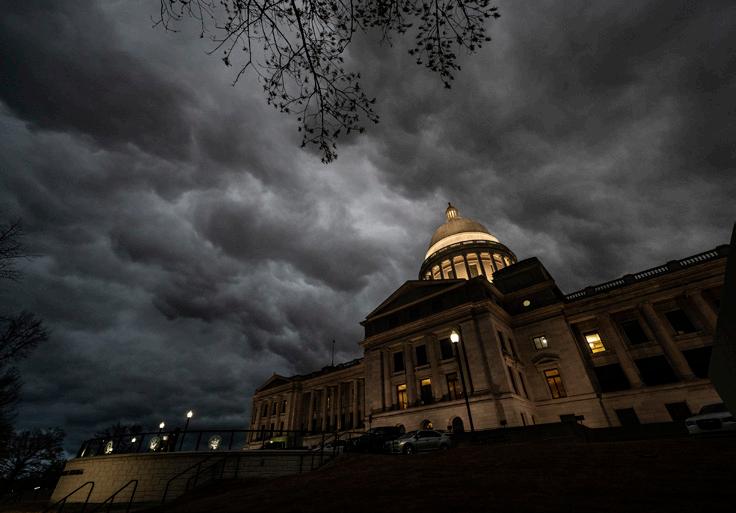
The bill also would allow the government to charge FOIA requesters if the time it takes to retrieve, review and redact the records exceeds eight hours. The press and other FOIA askers may also be charged at a rate that is, at most, the salary or hourly pay of the lowest-paid employee or contractor with the necessary skill and training to respond to the request.
Further, if approved, HB 1726 would extend the government's response time for FOI materials to more than triple, from three working days to 10 days. Following Ray's pitch for his bill, a parade of open government and transparency supporters made the strong case that the legislature would "undermine," "gut," "disembowel," and “destroy” one of strongest state FOIA laws in the nation.
In one of the more colorful testimonies before the House committee, University of Arkansas at Little Rock law professor Robert Steinbuch testified that the FOIA Task issued a strongly worded statement against HB 1726 for the first time in its fiveyear history.
"They have never issued an opinion like that before. That's how bad this bill is," said Steinbuch, a task force member and author of the definitive treatise on the state's FOIA law.
"The purpose of the FOIA, as you have heard, is to expose the government's deliberative process to the members of the taxpaying public so they can evaluate government performance and the performance of the people elected or appointed to do government business," he said. "But this bill would make it easier for the government to operate outside the public's view."
Toward the end of the three-hour hearing on HB 1726, Secretary of Public Safety and Director of Arkansas State Police Mike Hagar told the committee that while he supported open government, current law allowed internet vendors to profit from police chases and pursuit videos that rack up millions of views on social media platforms.
"As a result, we've had to assign two full-time employees, one attorney and two staff, to support the financial gain of these vendors," said Hagar. "One vendor currently has 4.4 million subscribers while generating untold financial gain."
Sonny Albarado, editor-in-chief for the Arkansas Advocate and a state FOIA Coalition member, ended the marathon hearing by telling the committee that those supporting HB 1726 represented varied government interests, not private citizens.
"I think the voice of the citizens should be heard," said Albarado. The veteran journalist and FOIA advocate then asked
Arkansas Publisher Weekly 3 March 31, 2023 Continued on Page 6
PRESS PASS

What is Earn Your Press Pass?

Earn Your Press Pass is a simple course, covering the basics of community journalism. It is designed to train those with limited or no news experience to work for their local newspaper,helping to create valuable coverage. It is taught by Lindsey Young, a community journalist and publisher with 10 years of high school teaching experience.
What does the course include?
A. Writing on deadline
B. Fun with leads
A. Taking good photos
B. Editing photos
A. Parts of a newspaper


B. Other terms to know
A. Who should I interview?
B. Preparing for an interview
C. Conducting an interview
D. Interview follow-up
E. Source problems and issues
F. Let’s practice.
A. Newsworthiness
B. News-writing basics
C. Breaking and hard news stories
D. Covering a meeting
E. Working a press release
F. Writing a feature story
G. Covering sports
H. Opinion writing
C. Using quotes
D. Headline writing
E. Cutline writing
F. Thinking outside the pyramid
C. Dealing with submitted photos
X.
A. Tips for effective editing
B. Revising and rewriting
C. Let’s practice.
•
A. Keeping yourself organized
B. Preparing files for layout
C. I have nothing to write about. Help!
Sections are feature videos and printable cheat sheets
• Lessons will continue to be added/updated.
A. Your right to know
B. Avoiding libel
C. Journalism ethics
D. Contradictions of community journalism
“I was extremely impressed. Lindsey even taught this old dog some new tricks. The content is solid, it’s easy to use, and you can sign into and out of the program as your time allows. Lindsey’s engaging nature makes the lessons enjoyable, which makes you look forward to the next segment.”
BAGGETT, TEXAS PRESS ASSOCIATION Executive vice president and a 50-year veteran of small and large Texas newsrooms
For more information, contact Ashley Kemp Wimberley at ashley@arkansaspress.org
EARN YOUR
ARKANSASPRESS.ORG
II. III.
Types of
Introduction
IV. I.
Interviewing
Stories
Newspaper Jargon V. VI. VII. VIII. Journalist Rights and Ethics
Writing Techniques Associated Press Style Editing
IX. Photography Final Bits of Advice
DONNIS
McDonald new reporter in Monticello
The AdvanceMonticellonian in Monticello has announced the hiring of Jeff McDonald to the editorial staff .
McDonald, a Southeast Arkansas native and graduate of the University of Arkansas at Monticello, has lived in Drew County for about 15 years. He and his wife, Holly, have one son.
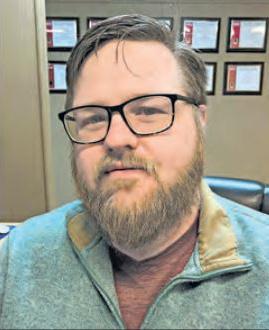
“I am happy to be back in Monticello working, and excited for the opportunity to be involved with my community,” McDonald said in the announcement of his hiring.
Reminder: Arkansas Press Women scholarship deadline is Saturday
Saturday, April 1 is the deadline for applications to the 2023 Arkansas Press Women scholarship contest.
Arkansas Press Women, an affiliate organization of the National Federation of Press Women serving Arkansas communicators and media professionals, awards a $1,000 scholarship each spring to an undergraduate junior or senior student who is majoring in journalism or mass communications at an Arkansas college or
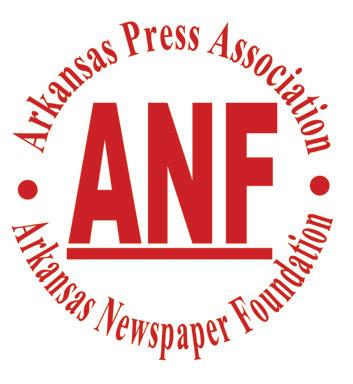
university.
Funding for this scholarship comes from APW’s Maudine Sanders Education Fund. Maudine Sanders, who died in 2011 at age 87, was a previous owner of the Springdale Morning News and a long-time member and past president of Arkansas Press Women.
Visit https://bit.ly/3wIxGI6 to apply. For more information, email Angie Faller, scholarship chair, at amfaller@ualr.edu.
News/Media Alliance applauds California State Assembly for California Journalism Preservation Act

The News/Media Alliance made a statement applauding California State Assemblymember Buffy Wicks (D-Oakland) for introducing the California Journalism Preservation Act (CJPA, AB 886), which would require Big Tech platforms such as Facebook and Google to pay news publishers a “journalism usage fee” to use local news content, on Tuesday, March 21.
• Promote the welfare of the community newspaper industry.
• Fund legislative efforts to protect transparency in state government.
• Cultivate educational opportunities for future journalists.
• Ensure the viability of the newspaper industry for years to come.
To donate, mail a check to: Arkansas Newspaper Foundation 411 South Victory Street Little Rock, AR 72201
“These dominant digital ad companies are enriching their own platforms with local news content without adequately compensating the originators,” Wicks said. “It’s time they start paying market value for the journalism they are aggregating at no cost from local media.”
According to the Alliance, creators of quality journalism are currently not adequately compensated for the use of their content that takes a tremendous investment to produce, and therefore, cannot reinvest enough in journalists and newsrooms. The CJPA would promote the hiring of more journalists, requiring news publishers to invest 70 percent of the profits from the usage fee into journalism jobs.
In response to the bill’s introduction, News/Media Alliance Executive Vice President & General Counsel Danielle Coffey said, “We applaud California Assemblymember Wicks for introducing this legislation and for recognizing the critical importance of high-quality journalism to ensuring informed and engaged communities. We hope Congress takes note and follows suit by reintroducing legislation at the federal level as well to give news publishers across the U.S. the same ability to be fairly compensated by the dominant tech platforms.”
The Alliance has been vocally advocating for such legislation at the federal level since 2018. A federal version of the JCPA, previously reintroduced in the 117th Congress (S. 673 and H.R. 1735), successfully passed out of the Senate Judiciary Committee in September 2022. The bill nearly passed into law in December. At that time, Meta threatened to remove news from in the U.S. if the JCPA passed, further demonstrating their outsized power.
For more information on the federal JCPA, visit www.JCPABill.com
Support the future of Arkansas Journalism
Foundation.
through the Arkansas Newspaper
Your donation will help:
Arkansas Newspaper Foundation is a 501c(3) organization. All donations
tax-deductible to the extent allowable under law. Arkansas Publisher Weekly 5 March 31, 2023
The
are
Jeff McDonald
SPJ asks Congress to reintroduce Journalist Protection Act
The Society of Professional Journalists (SPJ) sent a letter to members of Congress on Wednesday, March 22 requesting reintroduction of the Journalist Protection Act and increased support in passing it this congressional term.
The Journalist Protection Act was introduced five years ago by Sen. Richard Blumenthal, Sen. Bob Menendez and Rep. Eric Swalwell and, if passed, would make it a federal crime to knowingly assault a reporter engaging in the act of newsgathering.

“Journalists risk their lives every minute of every day when reporting in the field,” SPJ National President Claire Regan said. “SPJ has issued safety guidelines, but there is only so much newsroom leaders can do to protect their staff from harm in vulnerable situations. Passing the Journalist Protection Act would enhance the guidelines set forth by SPJ by going even further to make it a federal offense to knowingly assault journalists. It is time for Congress to finally pass this critical legislation."
In recent years, journalists have been assaulted at protests, rallies, crime scenes and while reporting in their communities, and most recently two journalists were shot in Florida in February.
In 2022, there were 40 assaults on journalists in the United States, according to the U.S. Press Freedom Tracker, and even more journalists were — and continue to be — threatened and harassed each day both in person and online.
The letter was sent to House Committee on the Judiciary, Chairman Jim Jordan and Ranking Member Jerrold Nadler; House Subcommittee on Crime, Terrorism, and Homeland Security; Senate Committee on the Judiciary, Chairman Dick Durbin and Ranking Member Lindsey Graham; Florida Senators Rick Scott and Marco Rubio; Florida Representatives Matt Gaetz, Neal Dunn, Kat Cammack, Aaron Bean, John Rutherford, Michael Waltz, Cory Mills, Bill Posey, Darren Soto, Maxwell Frost, Daniel Webster, Gus M. Bilirakis, Anna Paulina Luna, Kathy Castor, Laurel Lee, Vern Buchanan, Greg Steube, Scott Franklin, Byron Donalds, Sheila Cherfilus
McCormick, Brian Mast, Lois Frankel, Jared Moskowitz, Frederica Wilson, Debbie Wasserman Schultz, Mario DiazBalart, María Elvira Salazar and Carlos Gimenez; and Sen. Richard Blumenthal, Sen. Bob Menendez and Rep. Eric Swalwell
Public notice bill fails in House Committee on Wednesday
Continued from Page 1
readers to the move to a website should the municipality or county choose that option, among other things. The compromise also retained the required publication of delinquent tax lists in newspapers.
As part of the compromise, APA took no position on HB 1616.
“APA is thrilled that there will be no changes to publication of public notice in newspapers this legislative session,” said APA Executive Director Ashley Kemp Wimberley. “We are thankful to our members and friends of the association for their grassroots efforts in letting their legislators know they are against moving public notice to websites.”
House committee hears four hours of testimony on Freedom of Information bills; rejects one and approves the other
Continued from Page 3
the House committee to table HB 1726 for further study. "It deserves for all the stakeholders involved … to be able to hear and address specific problems with the FOIA, not a blanket exemption as this bill does."
After a do-pass recommendation and a motion request by Rep. Richard Womack, R-Arkadelphia, to reject Ray's bill, the House committee turned back the proposal in a voice vote. According to Committee Chairman Rep. Dwight Tosh, R-Jonesboro, 28 FOIA supporters were signed up to speak against HB 1726, while a dozen mostly law enforcement and Arkansas Municipal League members spoke in support of Ray's measure.
Immediately after the defeat of HB 1726, the House committee took up another special order of business to debate HB 1610 by Rep. Mary Bentley, R-Perryville. That bill returned to the committee after it was rejected in a voice vote in another threehour hearing on March 16. Bentley's original one-page bill would have changed FOIA language only to apply if there were a
quorum of lawmakers present.
Bentley told the House committee that she has since met twice with the FOIA Task Force during spring break and had amended her bill as a compromise proposal. "It is a compromise of what I brought to you before. I just think it is a tragedy that we don't allow our city and county elected officials to call each other on the phone," she testified.
Under the amended legislation, all meetings of more than onethird of Arkansas's local and municipal governing body members supported by public funds shall be "public meetings." Bentley's earlier open meetings portion of the FOIA would only apply if there were a quorum present. A minimum quorum is the number of board members needed to be present to act and differs from body to body.
After 30 minutes of testimony from several FOIA advocates who previously testified against HB 1726, the weary House committee voted 12-3 in favor of Bentley's bill. On Thursday, it passed on the House floor and is now headed to the Senate.
Arkansas Publisher Weekly 6 March 31, 2023
The national headline on stories about the latest poll on the news media and democracy were about its finding that half of Americans believe national news organizations deliberately "mislead, misinform or persuade the public to adopt a particular point of view through their reporting," as Associated Press media writer David Bauder put it. He added, "In one small consolation, Americans had more trust in local news."
It wasn’t a small consolation for people in local news, but it also had some warnings, and offered the basis for some guidance.
The poll by Gallup Inc. for the Knight Foundation, of 5,593 Americans 18 and older between May 31 and July 21, 2022, found a much higher level of trust in local news organizations.
That was driven in large measure by a belief that local journalists care about the impact of their reporting; 53% in the poll agreed with that statement and only 19% disagreed with it. (The survey is at https:// tinyurl.com/2eayncrw.)
Trust can be a hard thing to measure, because it is driven not just by facts, but by emotions, and the latter make it volatile. Research in news has shifted from issues of transparency and credibility to “the affective or emotional aspects of trust – that is, how trust in news is related to how people feel about news outlets," Knight said.
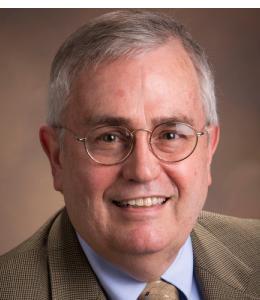

The poll asked respondents if they agreed or disagreed with this statement: “In general, most national news organizations “care about how their reporting can either positively or negatively affect American society, culture and politics.” Only 35% agreed, while 43% disagreed.
But when the poll asked if most local news organizations “care about the best interests of their readers, viewers and listeners,” those polled said yes, by a margin of 2 to 1.
Guest Column:
By Al Cross
“Care” is the key word here. Care, like trust, reflects emotion. It calls to mind a quote used by many but most often attributed to President Theodore Roosevelt: “Nobody cares how much you know until they know how much you care.” That’s always been good advice for politicians, but it’s also a good maxim for newspapers, which claim to know a lot but often fail to show they care. How do they do that?
"Emotional trust in news is driven by the belief that news organizations care, report with honest intentions and are reliable,” Knight said in reporting on its Gallup poll. And that can bridge political divides that are increasingly prevalent at the local level. “Greater emotional trust in local news is consistent across various demographic groups,” Knight said. ”For example, 31% of Republicans and 58% of Democrats express high levels of emotional trust in local news — a narrower gap than with emotional trust in national news." So, Americans trust their local news organizations, but do they really know them?
The poll found that 65% agreed with this statement: "In general, most local news organizations have the resources and opportunity to report the news accurately and fairly to the public." But the question left much to be desired; most Americans are not familiar with "most local news organizations," so a better question would have asked about “your local news organizations.”
Many if not most of those organizations are unable to report as much news as they once did or would like to do. Accuracy and fairness are essential, but audiences notice gaps in coverage, and that could have been measured, too.
AP’s Bauder described one other hopeful finding: "If Americans believed local news organizations didn’t have the resources

or opportunities to cover the news, they would be more likely to pay for it." As Knight said, "Americans who think local news organizations lack the resources and opportunity to report the news accurately and fairly are more likely to pay for news. . . . These findings mirror previous Gallup/ Knight research on local news, which found that Americans who are exposed to information about the financial challenges of local newspapers are more likely to donate to a nonprofit organization that supports local journalism."
Knight says journalists need to go beyond emphasizing transparency and accuracy to show the impact of their reporting on the public. That recommendation is directed to national news organizations, but it's good advice for local news organizations, too.
The poll reaffirms that they need to do that online, because that's where most of the audience is. It found that 58% of Americans in mid-2022 reported getting most of their news online, up from 46% in 2019. Television was named by 31%, down 10 points from 2019. Only 3% named printed newspapers or magazines, down from 5%.
Another key finding, described by Bauder: "The ability of many people to instantly learn news from a device they hold in their hand, the rapid pace of the news cycle, and an increased number of news sources would indicate that more Americans are on top of the news than ever before. Instead, an information overload appears to have had the opposite effect. The survey said 61% of Americans believe these factors make it harder to stay informed, while 37% said it’s easier."
That doesn't differentiate between national and local news, but the poll seems to confirm a trend pointed out by many observers: People are paying less attention to local news than they
To build trust and your audience, show how much you care, not just how much you know
Arkansas Publisher Weekly 7 March 31, 2023 Continued on Page 7
Guest Column: To build trust and your audience, show how much you care, not just how much you know
By Al Cross
Continued from Page 6
once did. That is a civic tragedy, in an age where misinformation can drive local and state policymaking. But I think it also reflects confusion about the plethora of information sources – confusion that news providers must clear up.
Providers of local news must give people reasons to seek it out, by showing its importance to their lives; make it easy to do so, by using multiple platforms to reach the fractured audience; and make clear its value – with watchdog reporting that

serves the public interest, opinion pages that operate on a higher level than social media, and editorial leadership that serves the community.
And news providers must help citizens grasp the differences in types of information. If I were running a local news outlet, I’d publish this every day: “We practice journalism, which is defined by a discipline of verification: We tell you how we know something, or we attribute it; and we’re mainly about facts, not opinion. Social media are mainly about
opinion, and have little if any discipline or verification. Which should you trust?”
Al Cross edited and managed rural newspapers before covering politics for the Louisville Courier Journal and serving as president of the Society of Professional Journalists. He directs the University of Kentucky’s Institute for Rural Journalism. It publishes The Rural Blog, from which this was adapted. For more information, write al.cross@uky.edu.
Arkansas Publisher Weekly 8 March 31, 2023

















